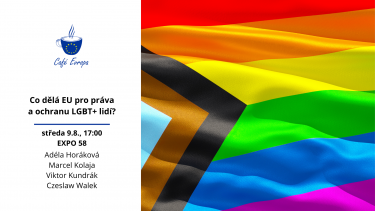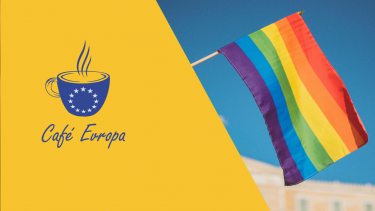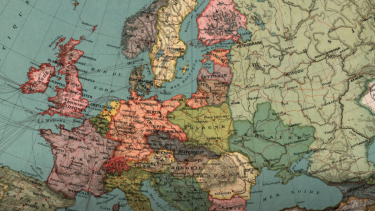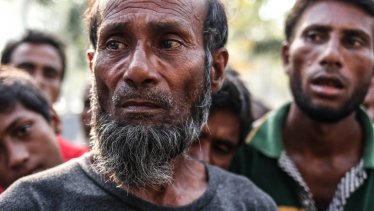RTVS | The European Parliament strongly condemned Hungary
On Thursday, the European Parliament condemned the Hungarian government's deliberate, continuous and systematic efforts to undermine the fundamental values of the European Union. The resolution, which was supported by 345 MEPs, expresses deep concern at the further erosion of democracy, the rule of law and fundamental rights in Hungary. What are the main reasons why the European Parliament has expressed its so far strongest reservations against Hungary? Žiga Faktor, director of our Brussels office and deputy director, commented on RTVS.
Show more
INVITATION | Café Evropa: What does the EU do for the rights and protection of LGBT+ people?
We cordially invite you to the next debate in the Café Evropa online series, this time on the topic "What does the EU do for the rights and protection of LGBT+ people?". The debate will take place on Wednesday 9 August.
Show moreEU MONITOR: The European Union’s Position Toward Ukraine’s EU Membership
Jakub Ferenčík wrote the EU Monitor on "The EU's stance on Ukraine's EU membership", where he discusses Ukraine's potential membership in the EU. Ferenčík also discusses the process of transitioning to EU membership and compares it to a similar process faced by some other countries, notably Serbia. In his work, the author discusses some of the factors of the transition process, from subscribing to EU values such as "human dignity, freedom and equality" to creating an area of "prosperity and neighbourhood".
Show more

Blesk: Epicentre: Zeman's outrageous insults of transgender people. And why hasn't the Czech Republic stood up for homosexuals?
The new Hungarian legislation has provoked a stormy reaction from the EU leadership. It bans education about sexual minorities in schools. However, the Czech Republic is one of the countries that has so far refused to join in the criticism of Hungary. In an interview with CNN Prima News on Sunday, President Miloš Zeman criticised women's political rights activists, the Me Too movement against sexual harassment and sexual minority events such as Prague Pride. His words that he finds transgender people "truly disgusting" have already gone around the world. Is the Czech Republic a progressive and liberal country, as Prime Minister Andrej Babiš claims? What are the implications of the condemnatory words of the head of state? These were the topics of Tuesday's Epicentre with Vladimír Bartovic, director of the EUROPEUM Institute for European Policy.
Show morePozvánka: Café Evropa online: The EU and the LGBTI theme - what are the European institutions doing in regards to the rights and protection of sexual minorities
EUROPEUM Institute for European Policy cordially invites you to another debate in the Café Evropa series. The discussion about "the EU and the LGBTI theme - what are the European institutions doing in regards of the rights and protection of sexual minorities?" will take place on Monday, August 3rd from 17:00 online on Café Evropa's Facebook page.
Show more
Good practices and lessons learned from the Visegrad Four and Western Balkans
EUROPEUM Institute for European Policy in association with Research Center of the Slovak Foreign Policy Association, Institute for Foreign Affairs and Trade, European Movement in Serbia, WiseEuropa Institute and Academy of European Integration and Negotiation published final Policy Paper about good practices and lessons learned from the Visegrad Four and Western Balkans.
Show more PDF

Commentary: EUCO Meeting in October 2019
EUCO meeting held on October 2019 brought several surprises. Read the comments of our experts regarding the future development of Brexit, EU enlargement or climate change combat. We've gathered answers from Christian Kvorning Lassen, Kateřina Davidová, Jana Juzová, Zuzana Stuchlíková, Louis Cox-Brusseau and Martin Michelot.
Show more PDF



One Hundred Years On: a New Central Europe from the Ruins?
As part of the project 1918 CEE Identity, Gábor Egry has written an essay that relates to the approaching hundred year anniversary of the collapse of the Central and Eastern European empires, and author analyzes, among other things, the common historical heritage of these newly created states.
Show more PDF
Myanmar, Rohingya Crisis: could the EU play an important role?
Our Benedetta Fornaciari da Passano in her new policy brief analyses the local situation in Myanmar connected with the discrimination of the Rohingya minority. She also tries to define the position of the EU and its possible engagement in the crisis.
Show more PDF
Turkey, the caliphate of Sultan Erdogan?
In his new blog, our Research Assistant Patrick Zingerle describes the current political situation in Erdogan's Turkey, from the army coup to the recent referendum strengthening the power in the hands of the Turkish president.
Show more
Staroměstské náměstí 4/1
Prague 1 - Staré Město
110 00
tel.: +420 212 246 552
email: europeum@europeum.org
https://www.europeum.org








